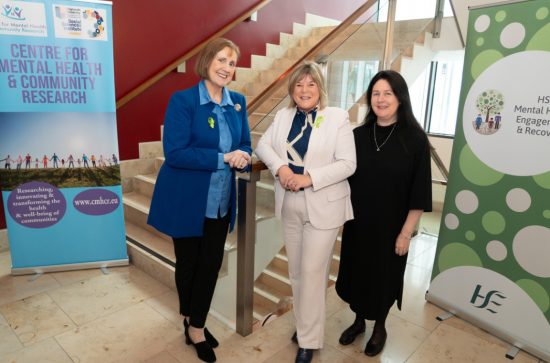
There is strong evidence from across the world to demonstrate the very significant role of whole family-focused practice in promoting mental health recovery, MU Professor of Family and Community Mental Health, Sinéad McGilloway, told an international conference in Dublin.
A whole-family approach means focusing not only on the needs of an adult mental health service user but, in parallel, identifying and addressing the needs of their family, including partners and children.
Addressing the conference hosted by the HSE Office of Mental Health Engagement and Recovery and Maynooth University Centre for Mental Health and Community Research, Prof McGilloway also highlighted the role of a whole-family approach in preventing the transmission of mental health difficulties across generations of families:
“Evidence shows that children’s lifetime risk of developing mental health difficulties increases by 41%-77% if their parent has a mental health challenge.”
She said that Ireland lags well behind many other countries in terms of whole-family policy and practice and the case for a strategic, innovative, multi-level and appropriately resourced approach, underpinned by policy, is now overwhelming and compelling.
Opening the conference, Minister of State for Mental Health and Older People, Mary Butler TD said: “I very much welcome whole-family approach to mental health services. Both I and the Government remain fully committed to the development of all aspects of mental health services nationally, including those for families, in line with national mental health policies Sharing the Vision, Connecting for Life and the annual HSE Service Plans.
“Ensuring that mental health services in this country are modern, equitable, and person-centred is a key focus of this Government. To this end I very much look forward to bringing the Mental Health Bill 2024 through the Oireachtas in the autumn legislative session.”
The conference highlighted the potential and significant level of need for whole-family approaches in terms of:
- Preventive generational mental health care
- Better outcomes for adult and child users
- Longer-term savings for health and social services
This event on 3 September, which was the first in Ireland to focus on this topic, included a talk by Arctic University of Norway Professor Camilla Lauritzen, a country which is a world leader in family-focused practice and policy.
She said: “Evidence from 15 years of research in Norway shows that while there are many barriers to effectively implementing family-focused practice, these can be addressed through appropriate policy and legislation, sufficient resourcing, strong interagency collaboration, cross-discipline training/supervision and peer support. So this conference is hugely important in helping us to build a better understanding of whole-family approaches and best practice to clarify the next steps for Ireland”.
Ireland is estimated to have the third highest incidence of adult mental illness across 36 countries in Europe — costing the State in excess of €11 billion per year, with an estimated 280,000 children dependent on parents who have a mental health illness.
Parent and advocate, Paula Callaghan, who has lived experience of family mental health challenges and recovery said: “Mental health services should include families so they can properly support their loved ones. This means meaningful interagency working and no more ‘them versus us’ barriers across different agencies and services.
“There is ‘no wrong door’ when a person is unwell and needs support. We urgently need to include the whole family throughout all stages of a person’s mental health and recovery journey while encouraging effective links across services.”
London School of Economics Associate Professorial Research Fellow in Health Policy and Health Economics David McDaid set out a strong economic case for supporting and involving all family members in the care of their loved one.
“Poor mental health has profound economic (and other) consequences. Joined up, preventive, family-focused approaches have been shown repeatedly to have significant benefits, not only in terms of promoting whole-family mental health and well-being in the community, but also economically in terms of long-term savings for health and social services, and also the wider economy.”
